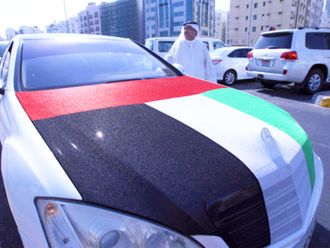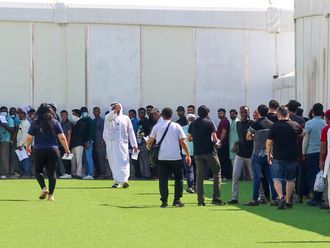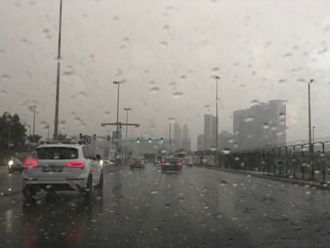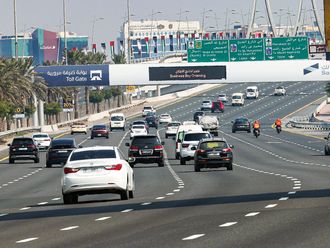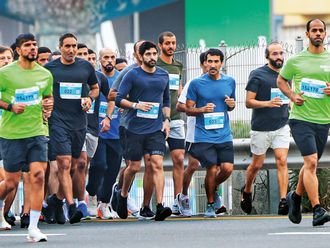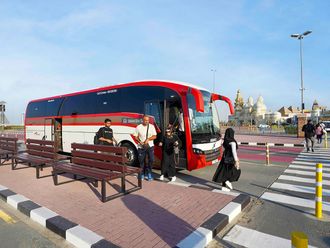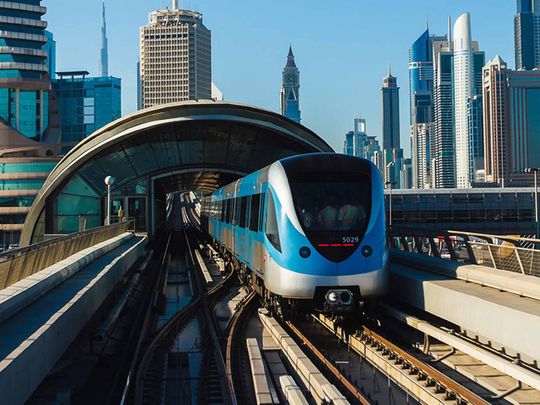
Dubai: The Roads and Transport Authority (RTA) has stepped up to provides taxi and bus services for people affected by the pandemic in addition to delivery services, a top official said on Thursday.
“There was a huge demand for delivery services, so we stepped in to provide logistical support to Union Coop to give you an example. Our support helped speed up deliveries and offered people additional services that eased their lives,” Mattar Al Tayer, director-general and chairman of RTA’s Board of Executive Directors, said.
Al Tayer, and Jamal Al Hai, Deputy CEO of Dubai Airports, addressed a remote press conference organised by the Government of Dubai Media Office in collaboration with Dubai TV.
The Dubai Government is continuing to exert comprehensive efforts to mitigate the Covid-19 situation within the framework of a robust plan to combat the crisis, the officials said.
Al Tayer pointed out that compared to an average of 1.3 million passengers transported daily on RTA’s public transport systems before the implementation of restrictions on movement, it currently only transports an average of 400,000 riders daily. Metro passengers dropped from an average of 643,000 passengers to 130,000 passengers daily.
International best practices
RTA follows follows the guidelines of the International Association of Public Transport (UITP) for public transport operators and passengers to safeguard public health amid the pandemic. For example, RTA has adopted strict measures to protect both drivers and passengers in its taxis and limousines. All drivers wear masks and gloves and regularly use sterilises. Their temperatures are checked at the beginning and completion of shifts.
RTA also conducts intensive sterilisation of its entire fleet of vehicles. Passenger capacity on buses was reduced from 70 to 30. In other measures, only three people including the driver are permitted to travel in a taxi car. Plastic separators have been installed in all vehicles to create a protective barrier between the driver and passengers. All public transport passengers are required to wear masks.
Guidelines in three areas
The UITP has provided precautionary guidelines in three key areas — sterilisation, protection of passengers and employees, and social distancing, said Al Tayer. When the metro was reopened, RTA put in place stringent precautionary measures based on the guidelines of the Supreme Committee of Crisis and Disaster Management, and in collaboration with the Dubai Health Authority (DHA) and Dubai Police.
Dubai Metro
All metro trains are thoroughly sterilised at the end of each trip. Furthermore, a total of 79 trains are sterilised daily after the close of operations. Apart from this, 47 metro stations are comprehensively sterilised on a daily basis. A team of 700 workers are devoted to implementing these measures. Signage on safe practices and etiquette to combat Covid-19 have been prominently displayed on public transport and stations while preventive guidelines have been distributed widely among passengers.
Dubai Taxis
Al Tayer responded to a series of questions on the operations of Dubai Taxi services. Out of Dubai Taxi’s fleet of 11,000 taxis, 5,000 continue to be in service, he said. RTA has added two new services, one to serve the needs of the health sector and the second to provide delivery services. Both buses and taxis are being used to transport patients and doctors. An average of 120 doctors are transported daily. A total of 120 drivers are dedicated to supporting the medical sector daily and transportation services are also provided for pharmacies.
Furthermore, Dubai Taxi has signed ten contracts to facilitate delivery services for essential supplies. RTA is looking at how fees can be adjusted to help franchise taxi companies operate profitably.
Digital channels
RTA runs four digital channels and a website to process customer requests online. There has been a 40 per cent average increase in digital transactions since the beginning of the crisis while during the National Sterilisation Programme, digital transactions surged by 300 per cent. Customer satisfaction has averaged at a high level of 91 per cent since the beginning of the crisis, said Al Tayer.
Emirates at forefront of cargo operations
Answering a question on the support extended by Dubai Airports to ensure efficient transportation of medical and food supplies and aid to other countries, Al Hai said that from the beginning of the crisis, Emirates airline doubled the number of journeys made for cargo operations. Passenger planes were converted into cargo planes to supplement logistics capacity. Emirates moved all its cargo operations from Al Maktoum International Airport to Dubai International Airport. The use of Cargo Village at Dubai International Airport helped raise cargo capacity, he added.
Currently, the airport services 110 cargo flights daily run by 12 airline companies including Emirates and flydubai. Al Hai stressed that despite the opening of new international routes, there were no delays in cargo operations. Efficient cargo operations helped ensure the undisrupted availability of all essential goods. The increased storage capacity offered by the government for medicines and food supplies has further helped ensure high levels of availability, he noted.
Repatriation
Al Hai also spoke about the operations conducted to repatriate stranded passengers to their home countries. Over 37,000 people have so far been safely repatriated to their home countries. Strict preventive measures were taken before repatriation operations were conducted. In collaboration with the National Emergency Crisis and Disaster Management Authority (NCEMA) and embassies in the UAE, arrangements were made to ensure the smooth and safe transportation of passengers. The strong relationships and coordination between Dubai Airport and other international airports enabled the efficient management of flight operations.
Based on requests from some countries, Dubai Airports continues to facilitate passenger flight operations to some destinations. However, most of the world’s airports are closed and scheduled flights will not be resumed before mid June or early July.
Relief package to partners
Responding to a question on initiatives to ease the business pressures on Dubai Airport’s aviation and business partners, Al Hai said Dubai Airports was among the first airports operators in the world to extend a relief package to its partners. The organisation has already held meetings with its strategic partners to discuss ways to restore operations post crisis. From March 1 to May 31, partners who had to cease trading due to the suspension of operations will enjoy a 100 per cent waiver of minimum guarantees or equivalent fees.


